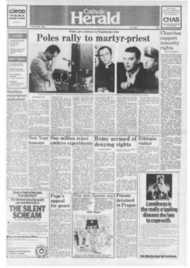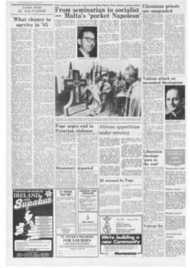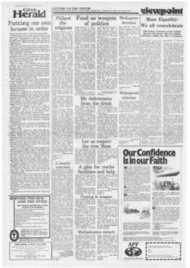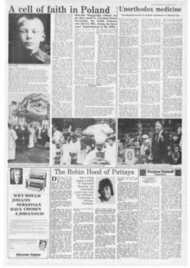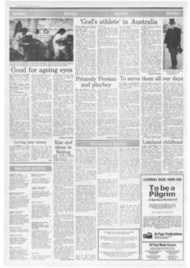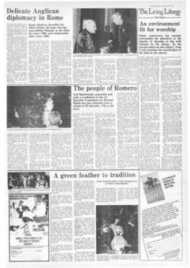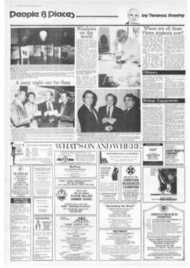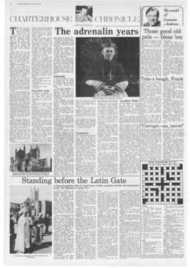Page 10, 4th January 1985
Page 10

Report an error
Noticed an error on this page?If you've noticed an error in this article please click here to report it.
Tags
Share
Related articles
Being One Mind And Heart On The Way To God...
Order Hands Over Control Of School
Augustinians Give Thanks For Revival Of Province
Chaplains At The Universities
His Week's Announcements
Standing before the Latin Gate
Fr James Scantlebury OSA of Austin Friars, Carlisle, responds to the Rev Ian Clutterbuck's article 'The Dilemma of Going Over'
IN SOUTH BAILEY, just behind the great west window of Durham Cathedral, lie two Anglican university colleges; Chad's — the Anglo-Catholic, John's the Evangelical one where I spent three years doing theology some years ago.
I recall one or two AngloCatholic characters who seemed to me to have found their way into the wrong college. They planned to start a society in John's to promote Catholicism, the 'Society of St John ante portam Latinam'. Nothing came of it!
I spent my first 28 years in the Church of England, an experience I have no cause to regret. I confess to having had little regard for AngloCatholicism even during those years when I was gradually coming to understand and feel the profound attraction of Catholicism. At last in 1977 I entered into full communion.
Ironically, I now have much greater sympathy with the enormous contribution AngloCatholics have made to modern Anglicanism. I don't think it is possible for Catholics to appreciate the sheer magnitude of their achievement — their work fostering Parish Communion, their missions in Africa and India, as well as their pastoral care in the poorer parts of England, their witness to traditional belief and moral practice, and a spirituality as biblical and patristic as ever it was Tridentine.
Occasionally I hear fellow priests speaking rather condescendingly of Anglo
Catholicism, for reasons somewhat different from those in the recent past — less now because they lack valid orders, more likely because they do not entertain as enthusiastically as do Catholics the "advanced" theology and pastoral attitudes which not so long ago both would have perceived as liberal protestant.
I can well understand what it is married Anglican clergy fear to lose in "coming over" — the possibility of pastoral and sacramental ministry, celebrating the Eucharist and preaching.
Many believe that they can best serve Catholicism by remaining where they are, to leaven Anglicanism for its eventual reunion with Rome. Ecumenical convergence, the tacit recognition of their Orders, the ARCIC accord, and the hope of Uniate status all seem to counsel staying put.
It is easy to point out the problems which have to be faced in remaining an Anglican Minister "Unwise theological speculation" is not, of course, peculiar to Anglicanism, but it has no magisterium to which appeal can be made by those who preach and teach, at least as a counter-weight to the influence of academic theologians.
Many in positions of power in the Church of England seem to be oblivious of the scandal caused to the clergy themselves, let alone laypeople, when bishops and Regius Professors of theology, appointed by the "Defender of the Faith", blithely deny basic dogmas of It is difficult to see what advantages accrue to the established Church by its continued submission to the State. There is surely something wrong with a ecclesiology which has to rely on Parliament in this day and age to prevent a schism within the mother Church of Anglicanism, like that which has afflicted the Anglican church in the United States.
Even Rome has re-negotiated its relationship with the "most Catholic" of States, Italy included. I believe that the establishment of the Church of England does inhibit mission in this country. It is still the singlemost 'powerful obstacle to genuine ecumenism. It is not quite sufficient to regard the sixteenth century break with Rome as "an accident of history".
I can see how some AngloCatholics fear to lose the liturgical splendour of their own traditions. These are more sober days within the Catholic church, liturgically anyway. Yet in many parishes the new Mass is celebrated with noticeable dignity and reverence, if not with much solemnity, in words and gesture which are, at least, authentic for us today.
Animating even those liturgical occasions which seem to 'fail' is the "mystery of faith", the sure belief that here is the sacrifice and real presence of Christ. Nothing is gained by Anglo-Catholics trying too hard to point out the liturgical beams in Italian eyes.
To have come into full communion has meant for me a sense of coming home, of finding my roots. It is not easy to say what it means to be in the Church to which our own Celtic and Saxon saints belonged, as well as those English men and women who paid with their lives for Catholicism, right down to modern times, the Church too of Augustine and Francis, Ignatius and the Cure d'Ars, of John XXIII and Paul IV.
How can the prospect of belonging to yet one more "splinter movement" compare with this?
There are certain things which ought to be done to help those now "poised on the edge of the Church of England". May I suggest: A full-hearted commitment by Catholic bishops in this country to use married Anglican clergy, on the frontiers of pastoral ministry, not just in the present parish set-up but in chaplaincies and in wholly new spheres of pastoral care.
Also I would like to see recognition of the man's diaconate so that he can continue to preach, and exercise some sacramental and catechetical ministry as soon as possible after 'coming over'.
But, above all, I long to see reexamination of the question of Anglican orders. The time is ripe. I do not think a favourable decision on Anglican orders will stop many 'coming over'. In fact those who do still come across do so less in search of "valid" orders than for that fulness of Catholic life and faith they never fail to find.
blog comments powered by Disqus


